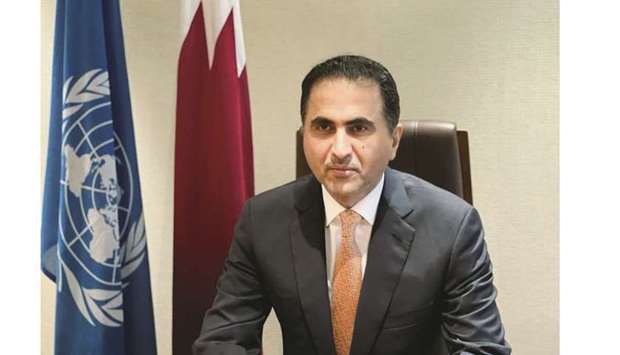Qatar has affirmed the responsibility of the international community and all governments, especially in countries experiencing an increase and rise of extreme right-wing groups, to confront hate speech that fuels feelings of hostility and violence against Muslims.
This came in the statement delivered by HE the Permanent Representative of Qatar to the United Nations Office in Geneva Ambassador Ali Khalfan al-Mansouri, during an interactive dialogue with the Special Rapporteur on freedom of religion or belief at the 46th regular session of the Human Rights Council.
HE al-Mansouri said Qatar shared the Special Rapporteur's opinion of the need to take effective measures to prevent direct and indirect discrimination against Muslims, to abolish all restrictions imposed on individuals for manifesting their religion, combat negative and discriminatory stereotyping practised by law enforcement agencies, establish and strengthen mechanisms for monitoring and reporting violations and holding those responsible accountable.
He added the report of the Special Rapporteur clarified the different contexts through which Muslims in a number of parts of the world are exposed to practices that violate their rights and freedoms within the framework of the so-called Islamophobia.
"While we condemn in the strongest terms these practices, we are concerned that manifestations of hatred and hostility towards Islam and Muslims are embodied in negative stereotypes that lead to prejudice and discrimination against Muslims, which leads to their exclusion from social, political and civil life, as it often results in adopting legislative and executive measures that contribute to further violation of their rights," he said.
The Permanent Representative noted that permitting these practices cannot express the values of the civilised world nor can it be justified under the pretext of spreading freedoms as freedom does not mean violating the rights of others.
This came in the statement delivered by HE the Permanent Representative of Qatar to the United Nations Office in Geneva Ambassador Ali Khalfan al-Mansouri, during an interactive dialogue with the Special Rapporteur on freedom of religion or belief at the 46th regular session of the Human Rights Council.
HE al-Mansouri said Qatar shared the Special Rapporteur's opinion of the need to take effective measures to prevent direct and indirect discrimination against Muslims, to abolish all restrictions imposed on individuals for manifesting their religion, combat negative and discriminatory stereotyping practised by law enforcement agencies, establish and strengthen mechanisms for monitoring and reporting violations and holding those responsible accountable.
He added the report of the Special Rapporteur clarified the different contexts through which Muslims in a number of parts of the world are exposed to practices that violate their rights and freedoms within the framework of the so-called Islamophobia.
"While we condemn in the strongest terms these practices, we are concerned that manifestations of hatred and hostility towards Islam and Muslims are embodied in negative stereotypes that lead to prejudice and discrimination against Muslims, which leads to their exclusion from social, political and civil life, as it often results in adopting legislative and executive measures that contribute to further violation of their rights," he said.
The Permanent Representative noted that permitting these practices cannot express the values of the civilised world nor can it be justified under the pretext of spreading freedoms as freedom does not mean violating the rights of others.

